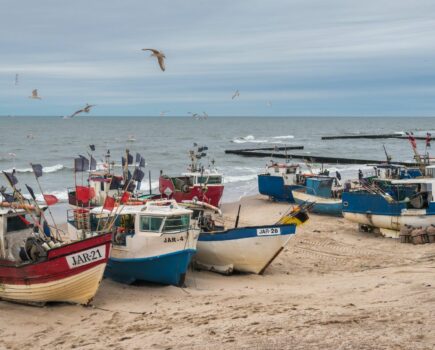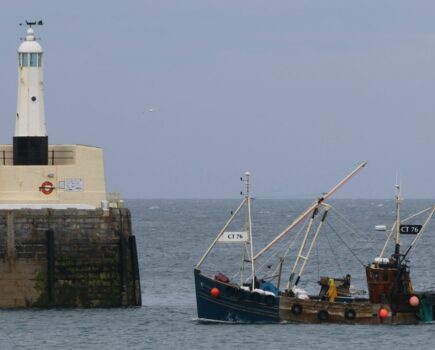PM proposes two-year Brexit transition. Uncertainty over fisheries and EU must agree.
The anticipated benefits for fishermen from Brexit could be delayed well beyond March 2019, after Theresa May proposed a two-year transition period in a major Brexit speech, reports Tim Oliver.
March 29, 2019, marks the official end of the two-year withdrawal period after the UK gave the EU official notice that the UK is to leave the European Union and, by implication, the CFP. But Theresa May, in a speech in Italy, said a two-year ‘period of implementation’ would be of mutual interest to the UK and EU.
Combined with the provision in the Withdrawal Bill to incorporate all EU law – including the CFP – into UK law, a two-year transition would mean that UK fishermen could be subject to the CFP and the status quo for at least another three-and-a-half years, until March 2021.
The Prime Minister said access to one another’s markets should continue on current terms during the implementation period. The length of the transition period should be determined by how long it will take to prepare and implement the new processes.
“As of today, these considerations point to an implementation period of around two years,” said the Prime Minister.
A two-year transition period could not go ahead without EU agreement. Chief negotiator Michel Barnier said after the speech that the EU wanted more details before it could decide whether the proposal would be in its interests. Any transition would have to respect the regulatory and financial framework of the single market.
Responding to Mrs May’s proposal, Mr Barnier said that without a withdrawal agreement, there could not legally be a transition period. He said: “I would like to be very clear: if we are to extend for a limited period the acquis (law) of the EU, with all its benefits, then logically this would require existing Union regulatory, budgetary, supervisory, judiciary and enforcement instruments and structures to apply.”
The proposals brought mixed reactions from the industry. The SFF said there should be only a nine-month ‘bridging period’ after the March 2019 Brexit date, while the NFFO said a transitional trade relationship could not include fisheries because the UK would not be part of the EU decision-making process during this period.
Fishing for Leave (FFL) said it was deeply concerned by the proposal. It has written to the Secretaries of State for both the Department for Exiting the EU (DexEU) and DEFRA, asking whether the government intends to have fisheries included in any transitional agreement.
NFFO: ‘There can’t be a legal vacuum’
The NFFO said the UK aspires to secure a transitional period of up to two years in which the UK would retain tariff-free market access to the EU.
“The plain legal situation is that the UK will leave the CFP at the point that the UK leaves the EU, and become an independent coastal state,” said chief executive Barrie Deas, following a meeting with DEFRA officials last Thursday.
“Although the UK could have a transitional trade relationship, this cannot include fisheries, because the UK would not be part of the EU decision-making process – Council of Ministers or European Parliament – during this period. Annual decisions on TACs and other aspects of fisheries management would be required. There cannot be a legal vacuum.
“Being outside the EU but no longer party to EU decisions through the Council of Ministers, alternative arrangements will have to be made to arrive at harvesting decisions on shared stocks that have to be taken during the transition period and beyond. In fisheries, the obvious mechanism is the annual bilateral (or trilateral) fisheries agreement, operating within the context of the UN Law of the Sea.
“This is what we expect to happen, because we can’t have a political or decision-making vacuum, and the UK will no longer be part of the EU decision-making mechanisms or institutions, notwithstanding transitional trade arrangements.”
SFF: Nine-month ‘bridging period’
The SFF rejected a two-year transition period and instead said there should be only a nine-month ‘bridging period’ after the March 2019 Brexit date. The SFF rejected a two-year transition period and instead said there should be only a nine-month ‘bridging period’ after the March 2019 Brexit date.
Chief executive Bertie Armstrong said the federation shared the vision of a global, free trading nation, able to chart our own way in the world.
“For UK fishing, that fits perfectly, given the radical change that Brexit will bring, on 29 March, 2019, to the practical governance of fishing and fishing opportunity in the UK EEZ,” he told Fishing News.
“We start from an almost ridiculously disadvantaged position – under the terms of the CFP, some 60% of the resource in our EEZ is awarded to non-UK EU member states. This arrangement will prevail until Brexit.
“We must, therefore, move away from this harmful condition as quickly as sensibly possible, noting the blunt argument that under the changes in rights and responsibilities it is time to place the needs of our own coastal communities above those of the EU member states who have enjoyed more than 40 years of uncosted subsidy.”
He said that under international law the UK becomes a coastal state at the point of Brexit, and there is, therefore, no need for a two-year transition or implementation period – access can be negotiated immediately. But he said that for practical reasons the SFF recognises that a bridging period will be necessary.
The federation recommends that it be set as the nine months remaining post-Brexit in 2019, and recommends the following steps:
● Recognise alignment of quota shares of commercial fish stocks with zonal attachment as the overall goal, and control of access as the primary instrument of change.
● Approach the 2018 coastal states negotiations as if the UK were a coastal state in its own right, aiming to ensure that all UK catching opportunity requirements for 2019 are met, in anticipation of changes to governance on Brexit day one.
● Assert the UK’s position as an independent coastal state during negotiations in the second half of 2019, to secure substantially better fishing opportunities in return for access in 2020 and sequentially in future years, just like any other coastal state.
“The change in governance that Brexit will bring has the potential to transform UK fishing into a leader of sustainable, responsible harvesting. There will be great outside pressure to maintain or at least run on the status quo. That would be a lamentable failure,” said Bertie Armstrong.
FFL: ‘Fishing must not be included’
FFL said Theresa May’s proposals amounted to seeing the status quo re-badged for an unspecified ‘transitional’ period. “It leaves Britain wide open to being in the same position in two years as now, trapped in purgatory.”
It said that Mr Barnier had made it ‘crystal clear’ that during any transitional period, the UK would still be in the EU in all but name, and would have to have to abide by the acquis (all EU law).
“By appealing for a transitional agreement that is only in the EU’s power to gift, the government has blown itself wide open, instead of being able to walk away under the premise of ‘no deal is better than a bad deal’, said FFL.
“The EU can now demand blind obedience to anything it wants – including a continuation of the CFP and continued access to Britain’s rich fishing grounds.
“Usually, in a negotiation, you only concede for something in return… we have conceded everything to get more of the same! This speech marks the start of Britain’s fishing and coastal communities being sacrificed again.
“No one voted for a transition period. This is just a way to kick the can down the road till the next election.”
FFL claimed the transition proposal showed that the ‘establishment’ wants to negate Brexit at all costs.
“In having to agree to a continuation of all EU law in order to get a transition, areas like fishing will be thrown to the wolves. This will suit those running the federations who never wanted or campaigned for Brexit and are only advocating keeping the status quo.”
FFL claims UK waters will be partitioned into an exclusive 12-mile zone for an under-10m ‘cottage industry/marine park’, to buy off the smaller vessels, appease the green NGOs and spin ‘Brexit means Brexit’. But outside 12 miles it will be ‘business as usual’ under a never-ending transition deal.
“The EU will keep its shares, and quotas will be kept, with a discard ban enforced. Choke species will force out the majority, and family businesses, and continue consolidation into the few hands running the federations.
“It is now vital that the government disproves the above assertion by categorically stating that fishing will not be part of this transitional arrangement,” said FFL.
FFL called on all fishermen to see the reality of what is happening and join its campaign for a clean break with the CFP.
“Fishing for Leave welcomes them to support our campaign for the implementation of replacement policy for all fishermen to prosper, to ensure an unequivocal clean break.
“The assertion that ‘only worry about getting our waters back and worry about policy later’ is playing right into the government’s hands of keeping the status quo, and will see this wonderful opportunity annihilated along with what’s left of the industry.
“We seriously hope that in time we will not be proved correct, as our predecessor FAL was in the 1990s.”
Read more from Fishing News here.








